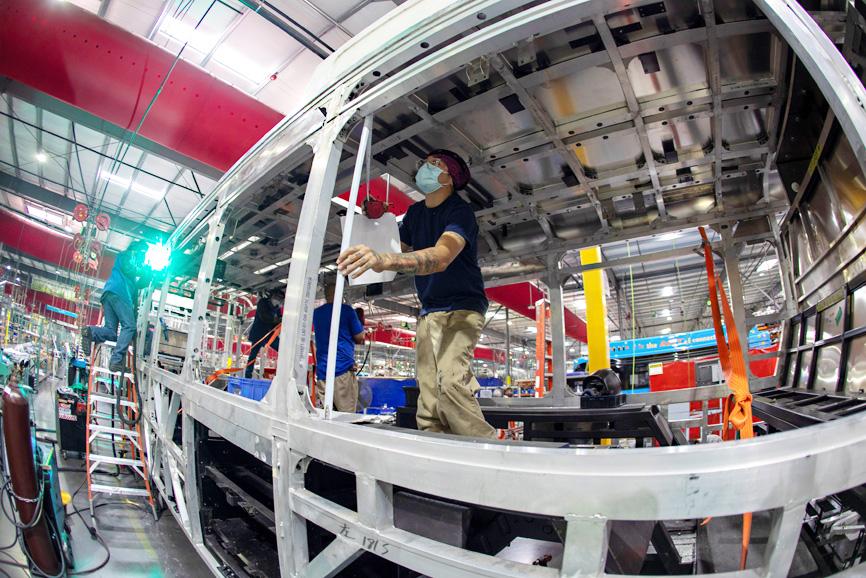China’s BYD Co (比亞迪) stopped production of fossil-fueled vehicles last month to focus on electric and hybrid cars amid Beijing’s promotion of greener vehicles to cut pollution, it said on Sunday.
The Shenzhen-based company would still produce and supply components for gasoline-fueled vehicles, and provide service and after-sales guarantees to existing customers, BYD said in its output and sales statement for last month to the Hong Kong Stock Exchange.
The company, which is backed by Warren Buffett, said it was committed to building low-carbon and environmentally friendly vehicles.

Photo: Reuters
“By doing this, BYD has become the first automotive manufacturer [in the world] to stop the production of fuel combusting vehicles,” it wrote on Twitter.
Data compiled by Bloomberg Intelligence shows battery-powered, plug-in hybrid sales overtook fossil-fuel vehicle sales last year for the first time for BYD.
BYD’s vehicle production rose 170 percent to 292,165 units in the first quarter of the year, including 4,635 oil-fueled units, the statement said.
The Chinese automaker, which also makes electric vehicle (EV) batteries, is the first domestic player to sell 100,000 EVs or plug-in hybrid cars per month, Beijing-based advisory firm Sino Auto Insights said.
“The announcement was pretty ceremonial,” Sino Auto founder Tu Le (涂樂) said. “What we’ll see is their acceleration into the EV sector. It enables them to focus, so they can move a little bit faster.”
BYD’s all-in shift is in contrast to what Ford Motor Co is doing, Tu added.
The US automaking giant last month said it would split its EV and legacy vehicle businesses into separate units within the company as it accelerates its electric shift.
Separately, Toyota Motor Corp reaffirmed its commitment to the UK after a newspaper reported it might halt making cars in the country because of government plans to shift more rapidly to fully electric vehicles.
The Japanese automaker said it is ready to sell only zero emission cars and reiterated its view that hybrids have a role to play in the transition by 2035, as the UK prepares to set new targets for the auto industry.
Toyota is focused on achieving a long-term and sustainable future in Europe, including for its British plants, the automaker said in an e-mailed statement.
The company was responding to a Sunday Times report that it had warned British Secretary of State for Transport Grant Shapps that it might cease manufacturing in Britain.
Toyota said it shares the UK’s ambition to head toward zero emissions, but declined to comment on the government’s mandates because it has not seen a draft of the rules being prepared by the British Department for Transport.
“We continue to see a role for many different technologies in the transition to zero emission based on the principle of mobility for all — including the current hybrid vehicles built in the UK,” Toyota said in the statement.
The UK plans to ban sales of new cars that run entirely on gasoline and diesel after 2030 and is permitting hybrid sales until 2035.

NOT JUSTIFIED: The bank’s governor said there would only be a rate cut if inflation falls below 1.5% and economic conditions deteriorate, which have not been detected The central bank yesterday kept its key interest rates unchanged for a fifth consecutive quarter, aligning with market expectations, while slightly lowering its inflation outlook amid signs of cooling price pressures. The move came after the US Federal Reserve held rates steady overnight, despite pressure from US President Donald Trump to cut borrowing costs. Central bank board members unanimously voted to maintain the discount rate at 2 percent, the secured loan rate at 2.375 percent and the overnight lending rate at 4.25 percent. “We consider the policy decision appropriate, although it suggests tightening leaning after factoring in slackening inflation and stable GDP growth,”

DIVIDED VIEWS: Although the Fed agreed on holding rates steady, some officials see no rate cuts for this year, while 10 policymakers foresee two or more cuts There are a lot of unknowns about the outlook for the economy and interest rates, but US Federal Reserve Chair Jerome Powell signaled at least one thing seems certain: Higher prices are coming. Fed policymakers voted unanimously to hold interest rates steady at a range of 4.25 percent to 4.50 percent for a fourth straight meeting on Wednesday, as they await clarity on whether tariffs would leave a one-time or more lasting mark on inflation. Powell said it is still unclear how much of the bill would fall on the shoulders of consumers, but he expects to learn more about tariffs

Greek tourism student Katerina quit within a month of starting work at a five-star hotel in Halkidiki, one of the country’s top destinations, because she said conditions were so dire. Beyond the bad pay, the 22-year-old said that her working and living conditions were “miserable and unacceptable.” Millions holiday in Greece every year, but its vital tourism industry is finding it harder and harder to recruit Greeks to look after them. “I was asked to work in any department of the hotel where there was a need, from service to cleaning,” said Katerina, a tourism and marketing student, who would

i Gasoline and diesel prices at fuel stations are this week to rise NT$0.1 per liter, as tensions in the Middle East pushed crude oil prices higher last week, CPC Corp, Taiwan (台灣中油) and Formosa Petrochemical Corp (台塑石化) said yesterday. International crude oil prices last week rose for the third consecutive week due to an escalating conflict between Israel and Iran, as the market is concerned that the situation in the Middle East might affect crude oil supply, CPC and Formosa said in separate statements. Front-month Brent crude oil futures — the international oil benchmark — rose 3.75 percent to settle at US$77.01